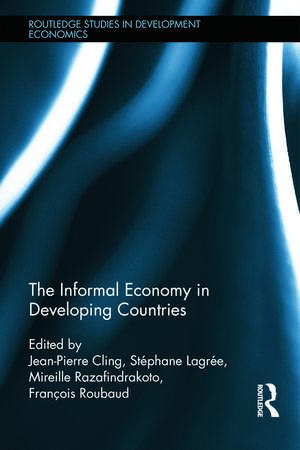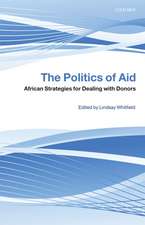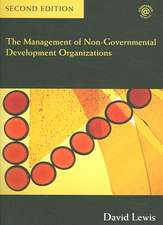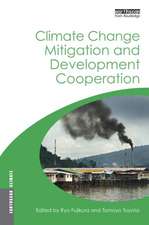The Informal Economy in Developing Countries: Routledge Studies in Development Economics
Editat de Jean-Pierre Cling, Stéphane Lagrée, Mireille Razafindrakoto, François Roubauden Limba Engleză Hardback – 22 iun 2014
This book aims to amend this situation by presenting recent high level research which studies the informal sector and informal employment. Fresh research into this subject is presented through empirical analysis which covers Asia, Africa and Latin America. Each chapter relies on data and a detailed knowledge of the context of the countries studied in order to question the dominant schools of thought on the origins and causes of informality. The results provide interesting insights into the constraints faced by informal workers, the dynamics of the informal economy and its link with poverty issues. On the basis of the evidences provided by results adequate policies could be defined to address informality issues.
The principal characteristics of the informal sector testify to some profound similarities between developing countries: low qualifications and the precariousness of jobs, mediocre incomes and working conditions, atomization of production units and lack of articulation with the formal economy, etc. This general statement does not contradict the observation that there is a high level of heterogeneity in the sector and in informal employment within each country, confirmed by several chapters in this work. In the absence of a sufficient number of job creations, the informal sector essentially constitutes a refuge for workers seeking and is here to stay in the short and medium term, even in emerging countries.
| Toate formatele și edițiile | Preț | Express |
|---|---|---|
| Paperback (1) | 419.11 lei 6-8 săpt. | |
| Taylor & Francis – 19 dec 2018 | 419.11 lei 6-8 săpt. | |
| Hardback (1) | 1169.97 lei 6-8 săpt. | |
| Taylor & Francis – 22 iun 2014 | 1169.97 lei 6-8 săpt. |
Din seria Routledge Studies in Development Economics
-
 Preț: 309.74 lei
Preț: 309.74 lei -
 Preț: 328.88 lei
Preț: 328.88 lei -
 Preț: 326.49 lei
Preț: 326.49 lei -
 Preț: 311.41 lei
Preț: 311.41 lei -
 Preț: 386.77 lei
Preț: 386.77 lei - 8%
 Preț: 390.50 lei
Preț: 390.50 lei -
 Preț: 260.82 lei
Preț: 260.82 lei - 18%
 Preț: 1165.24 lei
Preț: 1165.24 lei - 15%
 Preț: 470.31 lei
Preț: 470.31 lei - 18%
 Preț: 1057.05 lei
Preț: 1057.05 lei - 18%
 Preț: 1225.29 lei
Preț: 1225.29 lei - 18%
 Preț: 1113.63 lei
Preț: 1113.63 lei - 18%
 Preț: 1300.62 lei
Preț: 1300.62 lei - 26%
 Preț: 878.42 lei
Preț: 878.42 lei - 18%
 Preț: 1171.89 lei
Preț: 1171.89 lei - 18%
 Preț: 1059.45 lei
Preț: 1059.45 lei -
 Preț: 381.11 lei
Preț: 381.11 lei - 25%
 Preț: 823.63 lei
Preț: 823.63 lei - 21%
 Preț: 361.84 lei
Preț: 361.84 lei - 16%
 Preț: 274.01 lei
Preț: 274.01 lei - 18%
 Preț: 1060.87 lei
Preț: 1060.87 lei - 18%
 Preț: 1172.92 lei
Preț: 1172.92 lei - 18%
 Preț: 1171.89 lei
Preț: 1171.89 lei - 18%
 Preț: 1068.18 lei
Preț: 1068.18 lei - 18%
 Preț: 1060.19 lei
Preț: 1060.19 lei - 18%
 Preț: 1341.98 lei
Preț: 1341.98 lei - 18%
 Preț: 1169.16 lei
Preț: 1169.16 lei - 18%
 Preț: 1057.05 lei
Preț: 1057.05 lei - 15%
 Preț: 714.66 lei
Preț: 714.66 lei - 18%
 Preț: 1287.06 lei
Preț: 1287.06 lei - 18%
 Preț: 1124.73 lei
Preț: 1124.73 lei - 18%
 Preț: 1157.34 lei
Preț: 1157.34 lei - 25%
 Preț: 832.80 lei
Preț: 832.80 lei - 26%
 Preț: 850.91 lei
Preț: 850.91 lei - 18%
 Preț: 1066.79 lei
Preț: 1066.79 lei - 25%
 Preț: 658.19 lei
Preț: 658.19 lei - 25%
 Preț: 992.63 lei
Preț: 992.63 lei - 18%
 Preț: 1069.23 lei
Preț: 1069.23 lei - 15%
 Preț: 703.08 lei
Preț: 703.08 lei -
 Preț: 395.63 lei
Preț: 395.63 lei - 18%
 Preț: 706.91 lei
Preț: 706.91 lei -
 Preț: 422.96 lei
Preț: 422.96 lei - 18%
 Preț: 1055.38 lei
Preț: 1055.38 lei - 25%
 Preț: 993.85 lei
Preț: 993.85 lei - 18%
 Preț: 707.10 lei
Preț: 707.10 lei -
 Preț: 409.19 lei
Preț: 409.19 lei
Preț: 1169.97 lei
Preț vechi: 1426.79 lei
-18% Nou
Puncte Express: 1755
Preț estimativ în valută:
223.90€ • 233.46$ • 186.08£
223.90€ • 233.46$ • 186.08£
Carte tipărită la comandă
Livrare economică 20 martie-03 aprilie
Preluare comenzi: 021 569.72.76
Specificații
ISBN-13: 9780415730341
ISBN-10: 0415730341
Pagini: 366
Ilustrații: 74
Dimensiuni: 156 x 234 x 25 mm
Greutate: 0.64 kg
Ediția:New.
Editura: Taylor & Francis
Colecția Routledge
Seria Routledge Studies in Development Economics
Locul publicării:Oxford, United Kingdom
ISBN-10: 0415730341
Pagini: 366
Ilustrații: 74
Dimensiuni: 156 x 234 x 25 mm
Greutate: 0.64 kg
Ediția:New.
Editura: Taylor & Francis
Colecția Routledge
Seria Routledge Studies in Development Economics
Locul publicării:Oxford, United Kingdom
Public țintă
Postgraduate and UndergraduateCuprins
Part 1. 1. Labor Informality and Poverty in Latin America. The Case of Argentina, Brazil, Chile and Peru 2. Working in the Informal Sector: A Free Choice or an Obligation? An Analysis of Job Satisfaction in Vietnam 3. Intergenerational Transmission of Self-Employed Atatus in the Informal Sector: A Constrained Choice or better Income Prospects? Evidence from Seven West-African Countries 4. Integration of Formal and Informal Sectors in Craft Villages of the Red River Delta (Vietnam) 5. Social Insurance and Informal Economy in Vietnam: The Challenge of an Universal Coverage Part 2. 6. Efficiency of Informal Production Units and its Determinants: Applying the Quantile Regression Method in the Case of Antananarivo 7. Estimating the Returns to Education in the Informal Sector : The Case of Cameroon 8. Does Corruption Matter for Informal Sector Economic Performance? Microdata Evidence from Sub-Saharan Africa 9. Does forced Solidarity Hamper Entrepreneurial Activity? Evidence from Seven West-African Countries 10. The Political Economy of Micro Entrepreneurship: Why Does Microcredit Fail to Promote Self-Employment in Rural South-India? Part 3. 11. Informal versus Formal: A Panel Data Analysis of Earnings Gaps in Madagascar 12. Do limits exist to informality growth in South America? A preliminary exploration 13. Long term dynamic of the Labour market in Thailand: Transitions between the Formal and Informal Sectors 14. Dynamics of Informal Microenterprises and Poverty in Peru: A Panel Approach 15. Informality, Crisis and Public Policies in Vietnam
Descriere
Informality is ubiquitous in most developing countries. Understanding the informal economy is therefore of utmost importance from a political, economic and social point of view. Paradoxically, despite its economic importance, knowledge is extremely limited regarding the informal economy. It remains largely unrecognized by researchers, is neglected by politicians, and is even negatively perceived as it is meant to disappear with development.










